Module11 Body language复习课件(共15张PPT)
文档属性
| 名称 | Module11 Body language复习课件(共15张PPT) | 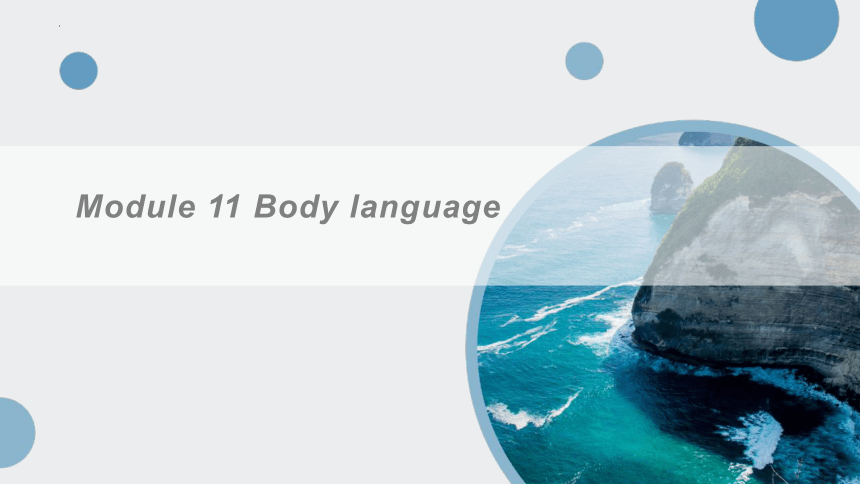 | |
| 格式 | zip | ||
| 文件大小 | 2.2MB | ||
| 资源类型 | 教案 | ||
| 版本资源 | 外研版 | ||
| 科目 | 英语 | ||
| 更新时间 | 2022-07-20 13:00:11 | ||
图片预览


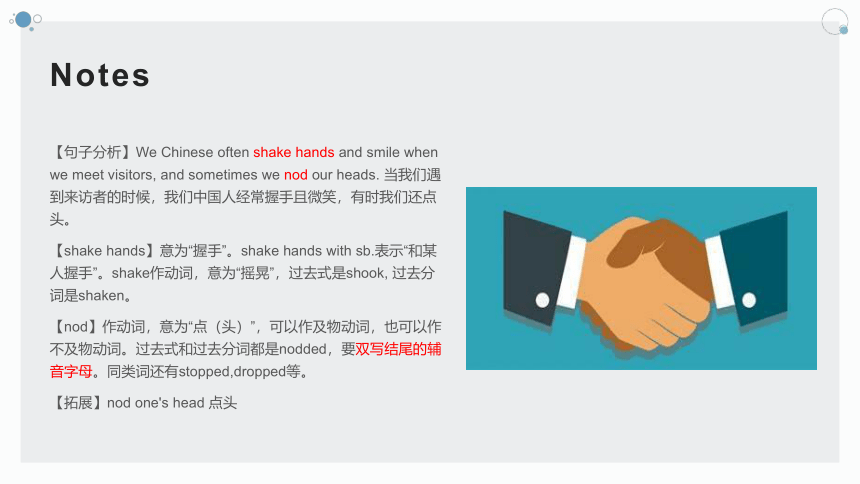
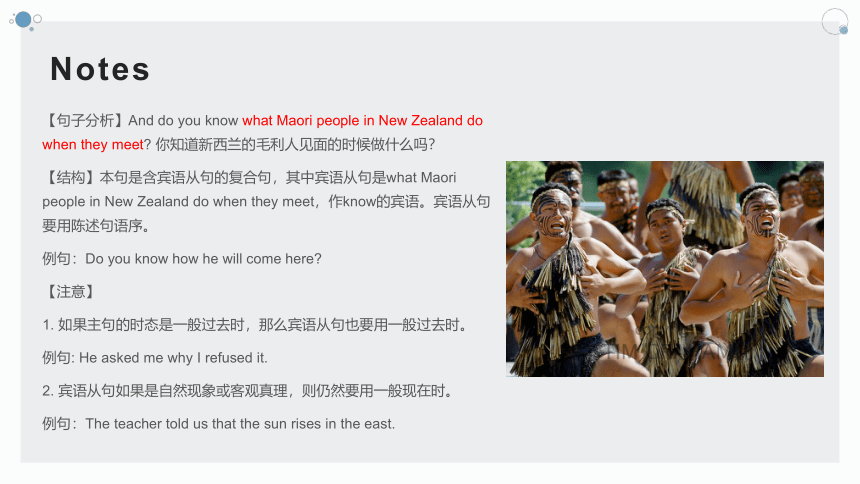
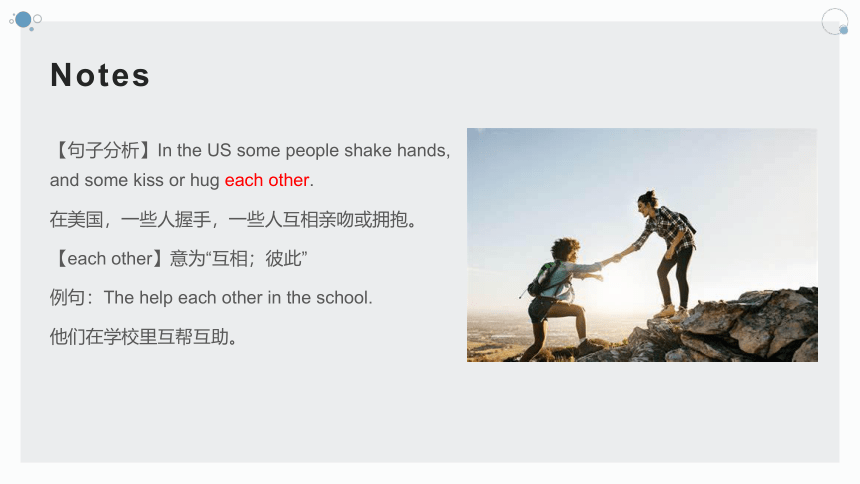
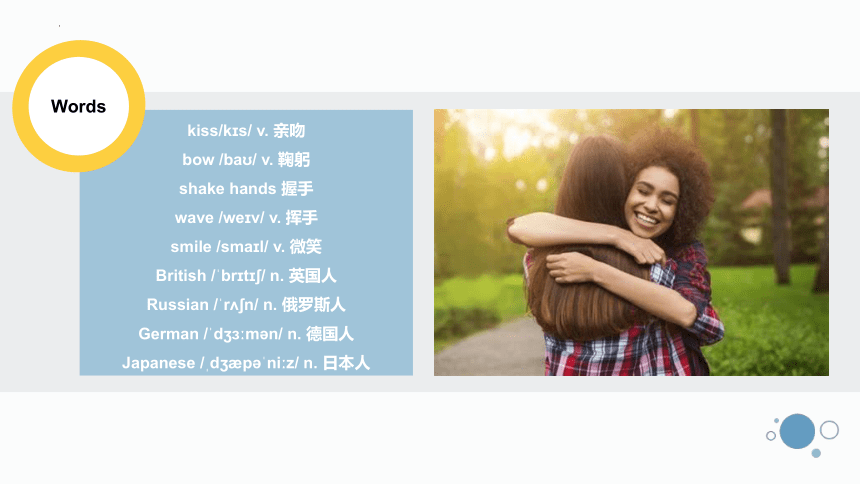
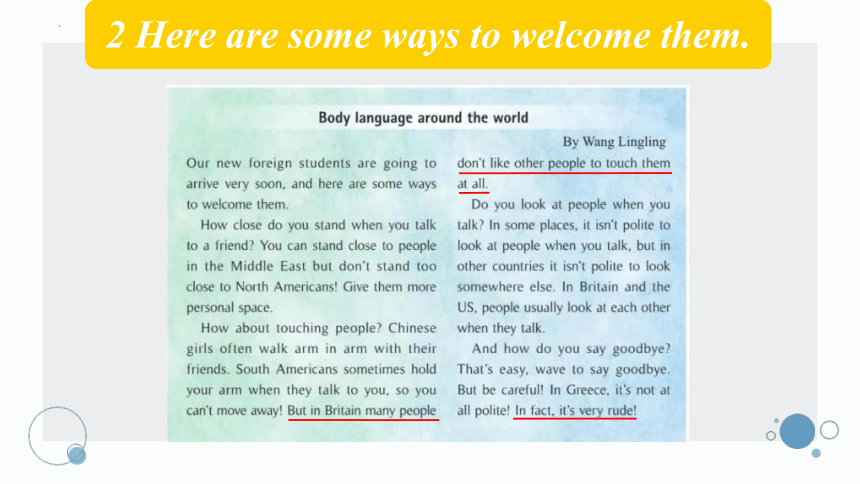
文档简介
(共15张PPT)
Module 11 Body language
1 They touch noses!
【句子分析】We Chinese often shake hands and smile when we meet visitors, and sometimes we nod our heads. 当我们遇到来访者的时候,我们中国人经常握手且微笑,有时我们还点头。
【shake hands】意为“握手”。shake hands with sb.表示“和某人握手”。shake作动词,意为“摇晃”,过去式是shook, 过去分词是shaken。
【nod】作动词,意为“点(头)”,可以作及物动词,也可以作不及物动词。过去式和过去分词都是nodded,要双写结尾的辅音字母。同类词还有stopped,dropped等。
【拓展】nod one's head 点头
Notes
【句子分析】And do you know what Maori people in New Zealand do when they meet 你知道新西兰的毛利人见面的时候做什么吗?
【结构】本句是含宾语从句的复合句,其中宾语从句是what Maori people in New Zealand do when they meet,作know的宾语。宾语从句要用陈述句语序。
例句:Do you know how he will come here
【注意】
1. 如果主句的时态是一般过去时,那么宾语从句也要用一般过去时。
例句: He asked me why I refused it.
2. 宾语从句如果是自然现象或客观真理,则仍然要用一般现在时。
例句:The teacher told us that the sun rises in the east.
Notes
【句子分析】In the US some people shake hands, and some kiss or hug each other.
在美国,一些人握手,一些人互相亲吻或拥抱。
【each other】意为“互相;彼此”
例句:The help each other in the school.
他们在学校里互帮互助。
Notes
kiss/k s/ v. 亲吻
bow /ba / v. 鞠躬
shake hands 握手
wave /we v/ v. 挥手
smile /sma l/ v. 微笑
British / br t / n. 英国人
Russian / r n/ n. 俄罗斯人
German / d m n/ n. 德国人
Japanese / d p ni z/ n. 日本人
Words
2 Here are some ways to welcome them.
【句子分析】But in Britain many people don't like other people to touch them at all. 但在英国,许多人一点都不喜欢别人触摸他们。
【not...at all】意为“一点也不;根本不”,表示强烈的否定。
【拓展】not at all是常见的口语表达,适用于以下场景
Notes
用来回答感谢,意为“不用谢;不客气” - Thank you for helping me.
- Not at all. 不客气
用来回答道歉,意为“没关系” - I'm sorry to keep you waiting.
- Not at all. 没关系
用来表示强烈的否定,意为“一点也不;根本不” - Is it difficult to learn English
- Not at all. 一点也不难
【句子分析】In some places, it isn't polite to look at people when you talk, but in other countries it isn't polite to look somewhere else. 在一些地区,交谈时看着对方是不礼貌的,但是在另外一些国家,交谈时看别的地方是不礼貌的。
【polite】形容词,意为“有礼貌的”
【反义词】impolite adj. 不礼貌的;无礼的
【派生词】politely adv. 有礼貌地
Notes
【句子分析】In fact, it's very rude!
事实上,那是很粗鲁的!
【in fact】意为“其实;事实上”。
【rude】形容词,意为“粗鲁的;无礼的”
例句:He is a rude person and often shouts at others.
【派生词】rudely adv. 粗鲁地;无礼地
例句:She shouted at the man rudely.
Notes
foot /f t/ n. 脚
eye /a / n. 眼睛
leg /leɡ/ n. 腿部
knee /ni / n. 膝盖
mouth /ma θ/ n. 嘴巴
finger / f ɡ (r)/ n. 手指
foreign / f r n/ adj. 外国的
personal / p s nl/ adj. 个人的
Words
Grammar 祈使句
【定义】表达说话人对对方的叮嘱、劝告、请求或命令等。
【用法】
1. 祈使句,无主语,动词原形作开始。
祈使句一般没有主语,主语you经常省略;句末用感叹号或句号,肯定结构都以动词原形打头。
例句:Go and ask the teacher. 去问问老师。
2. Do / Be / Let 三种形式,委婉请求用“请”字。
Do 型:行为动词原形 + 副词 例句:Sit down !
Be 型:Be 动词 + 表语 例句:Be quiet !
Let 型:Let + 人称代词宾格 + 动词原形 + 其他成分 例句:Let me help you.
拓展:为了使祈使句的语气婉转、客气,常加上 please “请”。
例句: Come here, please.
易错易混全解
【辨析】smile, laugh
smile 一般表示不出声地微笑,可以作名词,也可以作动词。 作名词:There is a big smile on her face.
作动词: She smiled at him.
laugh 指出声地“笑;大笑”。laugh at sb. 意为“嘲笑某人” John told a funny joke. We all laughed.
易错易混全解
【辨析】somewhere, anywhere, nowhere, everywhere
。
somewhere 表示“在某处;到某处”,通常用在肯定句中 Let's go somewhere quiet.
anywhere 表示“在任何地方”,通常用在否定句或疑问句中;还可以用在肯定句中,此时表示“在任何地方;随便哪个地方” I can't find it anywhere.
nowhere 表示“什么地方都不”,和 not...anywhere He has nowhere to go.
everywhere 表示“到处;住处;所有地方” I'm looking for my keys everywhere.
1. - Excuse me, could you please tell me __________ - It's nine o' clock.
A. where you have your art lesson B. where do you have your art lesson
C. what time you have your art lesson D. what time do you have your art lesson
2. - I'm sorry, Mrs. Lane. I was late. - _________. But don't be late next time.
A. Good idea B. Not at all C. I'm sorry D. My pleasure
3. __________ every day, and you will keep in good health.
A. Exercising B. To exercise C. Exercise D. Exercised
4. - Peter, __________ listen to music in class. - Sorry, Ms. Clark.
A. can't B. don't C. mustn't D. doesn't
5. No one can be right all the time. When people make mistakes, we shouldn't __________ them.
A. wait for B. send for C.knock at D. laugh at
3 Language in use
C
B
C
B
D
Module 11 Body language
1 They touch noses!
【句子分析】We Chinese often shake hands and smile when we meet visitors, and sometimes we nod our heads. 当我们遇到来访者的时候,我们中国人经常握手且微笑,有时我们还点头。
【shake hands】意为“握手”。shake hands with sb.表示“和某人握手”。shake作动词,意为“摇晃”,过去式是shook, 过去分词是shaken。
【nod】作动词,意为“点(头)”,可以作及物动词,也可以作不及物动词。过去式和过去分词都是nodded,要双写结尾的辅音字母。同类词还有stopped,dropped等。
【拓展】nod one's head 点头
Notes
【句子分析】And do you know what Maori people in New Zealand do when they meet 你知道新西兰的毛利人见面的时候做什么吗?
【结构】本句是含宾语从句的复合句,其中宾语从句是what Maori people in New Zealand do when they meet,作know的宾语。宾语从句要用陈述句语序。
例句:Do you know how he will come here
【注意】
1. 如果主句的时态是一般过去时,那么宾语从句也要用一般过去时。
例句: He asked me why I refused it.
2. 宾语从句如果是自然现象或客观真理,则仍然要用一般现在时。
例句:The teacher told us that the sun rises in the east.
Notes
【句子分析】In the US some people shake hands, and some kiss or hug each other.
在美国,一些人握手,一些人互相亲吻或拥抱。
【each other】意为“互相;彼此”
例句:The help each other in the school.
他们在学校里互帮互助。
Notes
kiss/k s/ v. 亲吻
bow /ba / v. 鞠躬
shake hands 握手
wave /we v/ v. 挥手
smile /sma l/ v. 微笑
British / br t / n. 英国人
Russian / r n/ n. 俄罗斯人
German / d m n/ n. 德国人
Japanese / d p ni z/ n. 日本人
Words
2 Here are some ways to welcome them.
【句子分析】But in Britain many people don't like other people to touch them at all. 但在英国,许多人一点都不喜欢别人触摸他们。
【not...at all】意为“一点也不;根本不”,表示强烈的否定。
【拓展】not at all是常见的口语表达,适用于以下场景
Notes
用来回答感谢,意为“不用谢;不客气” - Thank you for helping me.
- Not at all. 不客气
用来回答道歉,意为“没关系” - I'm sorry to keep you waiting.
- Not at all. 没关系
用来表示强烈的否定,意为“一点也不;根本不” - Is it difficult to learn English
- Not at all. 一点也不难
【句子分析】In some places, it isn't polite to look at people when you talk, but in other countries it isn't polite to look somewhere else. 在一些地区,交谈时看着对方是不礼貌的,但是在另外一些国家,交谈时看别的地方是不礼貌的。
【polite】形容词,意为“有礼貌的”
【反义词】impolite adj. 不礼貌的;无礼的
【派生词】politely adv. 有礼貌地
Notes
【句子分析】In fact, it's very rude!
事实上,那是很粗鲁的!
【in fact】意为“其实;事实上”。
【rude】形容词,意为“粗鲁的;无礼的”
例句:He is a rude person and often shouts at others.
【派生词】rudely adv. 粗鲁地;无礼地
例句:She shouted at the man rudely.
Notes
foot /f t/ n. 脚
eye /a / n. 眼睛
leg /leɡ/ n. 腿部
knee /ni / n. 膝盖
mouth /ma θ/ n. 嘴巴
finger / f ɡ (r)/ n. 手指
foreign / f r n/ adj. 外国的
personal / p s nl/ adj. 个人的
Words
Grammar 祈使句
【定义】表达说话人对对方的叮嘱、劝告、请求或命令等。
【用法】
1. 祈使句,无主语,动词原形作开始。
祈使句一般没有主语,主语you经常省略;句末用感叹号或句号,肯定结构都以动词原形打头。
例句:Go and ask the teacher. 去问问老师。
2. Do / Be / Let 三种形式,委婉请求用“请”字。
Do 型:行为动词原形 + 副词 例句:Sit down !
Be 型:Be 动词 + 表语 例句:Be quiet !
Let 型:Let + 人称代词宾格 + 动词原形 + 其他成分 例句:Let me help you.
拓展:为了使祈使句的语气婉转、客气,常加上 please “请”。
例句: Come here, please.
易错易混全解
【辨析】smile, laugh
smile 一般表示不出声地微笑,可以作名词,也可以作动词。 作名词:There is a big smile on her face.
作动词: She smiled at him.
laugh 指出声地“笑;大笑”。laugh at sb. 意为“嘲笑某人” John told a funny joke. We all laughed.
易错易混全解
【辨析】somewhere, anywhere, nowhere, everywhere
。
somewhere 表示“在某处;到某处”,通常用在肯定句中 Let's go somewhere quiet.
anywhere 表示“在任何地方”,通常用在否定句或疑问句中;还可以用在肯定句中,此时表示“在任何地方;随便哪个地方” I can't find it anywhere.
nowhere 表示“什么地方都不”,和 not...anywhere He has nowhere to go.
everywhere 表示“到处;住处;所有地方” I'm looking for my keys everywhere.
1. - Excuse me, could you please tell me __________ - It's nine o' clock.
A. where you have your art lesson B. where do you have your art lesson
C. what time you have your art lesson D. what time do you have your art lesson
2. - I'm sorry, Mrs. Lane. I was late. - _________. But don't be late next time.
A. Good idea B. Not at all C. I'm sorry D. My pleasure
3. __________ every day, and you will keep in good health.
A. Exercising B. To exercise C. Exercise D. Exercised
4. - Peter, __________ listen to music in class. - Sorry, Ms. Clark.
A. can't B. don't C. mustn't D. doesn't
5. No one can be right all the time. When people make mistakes, we shouldn't __________ them.
A. wait for B. send for C.knock at D. laugh at
3 Language in use
C
B
C
B
D
同课章节目录
- Module 1 Lost and found
- Unit 1 Whose bag is this?
- Unit 2 Are they yours?
- Unit 3 Language in use
- Module 2 What can you do ?
- Unit 1 I can play the piano
- Unit 2 I can run really fast
- Unit 3 Language in use
- Module 3 Making plans
- Unit 1 What are you going to do at the weekends?
- Unit 2 We're going to cheer the players.
- Unit 3 Language in use
- Module 4 Life in the future
- Unit 1 Everyone will study at home
- Unit 2 Every family will have a small plane.
- Unit 3 Language in use
- Module 5 Shopping
- Unit 1 What can I do for you?
- Unit 2 You can buy everything on the Internet
- Unit 3 Language in use
- Module 6 Around town
- Unit 1 Could you tell me how to get to the Nationa
- Unit 2 The London Eye is on your right.
- Unit 3 Language in use
- Revision module A
- Module 7 My past life
- Unit 1 I was born in a small village.
- Unit 2 I was born in Quincy.
- Unit 3 Language in use
- Module 8 Story time
- Unit 1 Once upon a time….
- Unit 2 Goldilocks hurried out of the house.
- Unit 3 Language in use
- Module 9 Life history
- Unit 1 He left school and began work at the age of
- Unit 2 He decided to be an actor.
- Unit 3 Language in use
- Module 10 A holiday journey
- Unit 1 What did you do?
- Unit 2 This morning we took a walk.
- Unit 3 Language in use
- Module 11 Body language
- Unit 1 They touch noses!
- Unit 2 Here are some ways to welcome them.
- Unit 3 Language in use
- Module 12 Western music
- Unit 1 It's so beautiful!
- Unit 2 Vienna is the centre of European classical
- Unit 3 Language in use
- Revision module B
